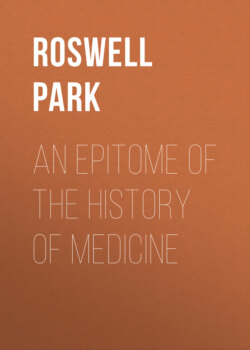An Epitome of the History of Medicine

Реклама. ООО «ЛитРес», ИНН: 7719571260.
Оглавление
Roswell Park. An Epitome of the History of Medicine
An Epitome of the History of Medicine
Table of Contents
AN EPITOME OF THE HISTORY OF MEDICINE
CHAPTER I
Original
Original
AGE OF FOUNDATION
Original
CHAPTER II
Original
Original
CHAPTER III
Original
CHAPTER IV
THE AGE OF RENOVATION
Original
Original
Original
CHAPTER V
Original
Original
Original
Original
Original
Original
Original
Original
Original
THE INFLUENCE OF THE OCCULT SCIENCES ON THE MEDICINE OF THIS PERIOD
Original
CHAPTER VI
Original
CHAPTER VII
Original
Original
Original
Original
Original
Original
CHAPTER VIII
Original
Original
Original
Original
Original
Original
Original
CHAPTER IX
Original
CHAPTER X
Original
Original
Original
Original
Original
CHAPTER XI
HISTORY OF MEDICINE IN AMERICA
Original
Original
Original
Original
Original
Original
Original
Original
Original
Original
Original
Original
CHAPTER XII
THE HISTORY OF ANÆSTHESIA
Original
Original
CHAPTER XIII
THE HISTORY OF ANTISEPSIS
Original
CHAPTER XIV
AN EPITOME OF THE HISTORY OF DENTISTRY
INDEX
INDEX
Отрывок из книги
Roswell Park
Published by Good Press, 2019
.....
Hippocrates wrote at least three treatises concerning hygiene: The first, on Airs, Waters, and Places; the second, on Regimen; the third, on Salubrious Diet—practically an abridgement of the preceding, in which he recommends the habit of taking one or two vomits systematically every month. The classification of diseases into internal or medical, and external or surgical, is not modern, but is due to Hippocrates; neither is it philosophic, although it is very convenient.
With so little knowledge of physiology and pathology as the ancients had, it is not strange that they ascribed undue importance to external appearance; in other words, to what has been termed semeiotics, which occupies a very considerable place in the medical treatises of the Asclep-iadæ. Indeed, the writings on this subject constitute more than one-eighth part of the entire Hippocratic collection. To prognosis, also, Hippocrates ascribed very great importance, saying that "The best physician is the one who is able to establish a prognosis, penetrating and exposing first of all, at the bedside, the present, the past, and the future of his patients, and adding what they omit in their statements. He gains their confidence, and being convinced of his superiority of knowledge they do not hesitate to commit themselves entirely into his hands. He can treat, also, so much better their present condition in proportion as he shall be able from it to foresee the future," etc.
.....